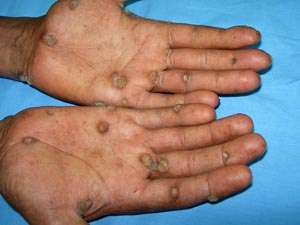Genetic malfunction causes hyperactive inflammation and cancer susceptibility

Mutations in an immune gene underlie two inflammatory skin diseases, according to research led by A*STAR scientists. These findings reveal a mechanism that could control inflammation and offer routes to investigate it further.
In 2011, Bruno Reversade's lab at the A*STAR Institute of Medical Biology was part of an international team that discovered the mutation behind multiple self-healing squamous epithelioma (MSSE), a disease which causes multiple invasive skin tumors that spontaneously disappear. Doctors later approached the team seeking to identify the genetic basis of a similar disease. "When we saw the first family, we thought it was MSSE," says Reversade. However, in 2015 his lab discovered that the condition was a novel disease, multiple self-healing palmoplantar carcinoma (MSPC), in which painful lesions form on the palms and feet and then spontaneously heal after several months.
While investigating the cause of MSPC, Reversade's team and collaborators found a family that had symptoms similar to MSPC, but was diagnosed with another skin disease, familial keratosis lichenoides chronica (FKLC). After sequencing all the expressed genes in several MSPC and FKLC patients, they found that both diseases were caused by mutations in the gene NLRP1. Usually this gene is involved in forming the inflammasome, a component of our immune system which activates inflammation.
The team showed that NLRP1 is the most prominent inflammasome sensor in keratinocytes, skin cells that had not generally been considered immune cells. "Humans are covered with keratinocytes, which provide a protective barrier against the external environment. We've now shown that they are also poised to participate in immune response in the form of inflammasome activation via NLRP1," says Reversade.
When this response goes awry, it causes diseases such as MSPC and FKLC. Active NLRP1 molecules connect to each other to initiate the inflammasome, a process that is normally inhibited by specific domains of NLRP1. The team showed the mutations behind MSPC and FKLC disrupt these domains, making NLRP1 more prone to activate and cause aberrant inflammation.
The gene's normal role remains a mystery, and unlike most genes, it is surprisingly variable in healthy populations. "A handful of individuals in Iceland lack the gene altogether. Our hypothesis is that each NLRP1 variant has a different threshold for activation of the inflammasome," explains Franklin Zhong, a researcher in Reversade's group who led the study. "Where we land on the spectrum is probably important for how healthy our skin is. It could affect how easily you get inflammatory skin disease or even skin cancer when you get old. Proving that is going to be difficult, but that's our aim."
More information: Franklin L. Zhong et al. Germline NLRP1 Mutations Cause Skin Inflammatory and Cancer Susceptibility Syndromes via Inflammasome Activation, Cell (2016). DOI: 10.1016/j.cell.2016.09.001



















